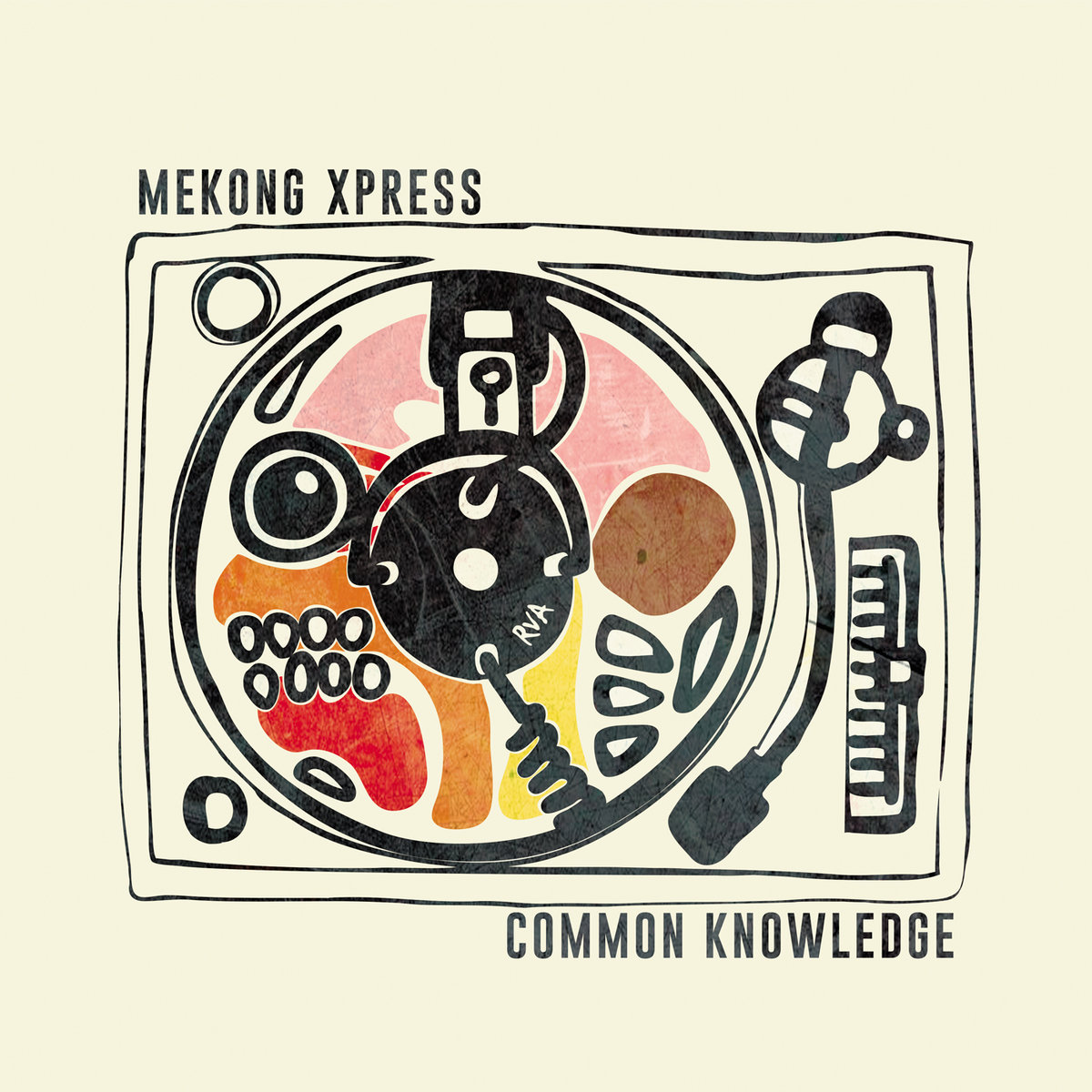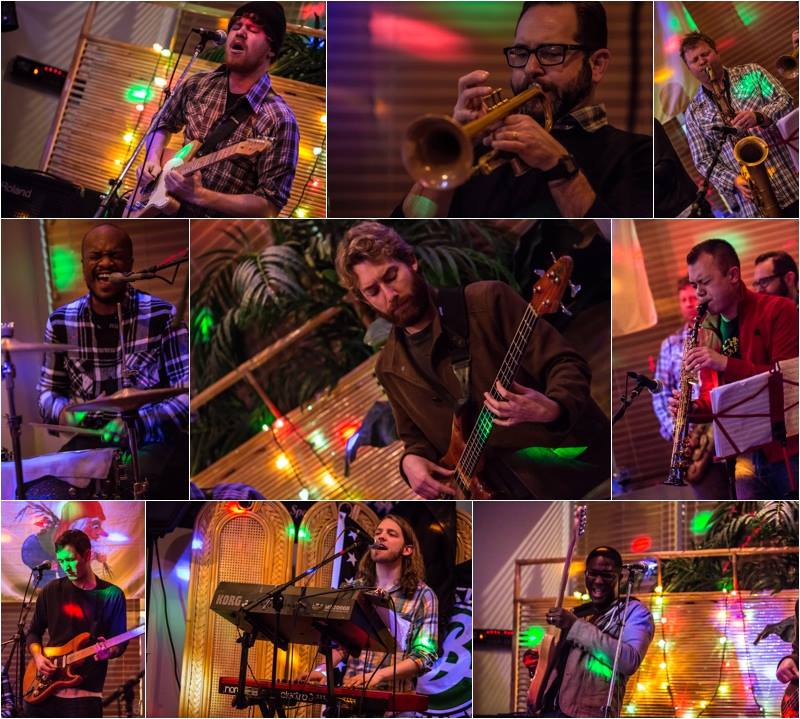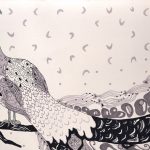Common Knowledge, Common Ground: An Interview With Mekong Xpress
Mercifully, I don’t remember much from my youth soccer days. But I can distinctly recall one of my coaches shouting during practice about how we needed to learn to rest while running. Rest… while running. It still seems a little ridiculous, but it’s true: If you’re a gifted player, your version of standing still is still moving.
The gifted players in Mekong Xpress are the same way. Their version of catching their breath after gigs around town and around the country is making more music, and the sound that’s crystallized during a longtime Monday residency that began at Mekong Restaurant and has continued since 2014 at the adjacent Answer Brewpub will soon be available via EggHunt Records in the form of the outstanding and uplifting Common Knowledge LP, out on October 19th.
What started as a weekly musicians’ hang has evolved into one of the tightest and most stylistically deep groups you’ll find in Richmond or elsewhere, led by a core that includes bassist Todd Herrington, drummer Kelli Strawbridge, keys player Ben White, and guitarist Andrew Rapisarda. With the help of an all-star horn section (J.C. Kuhl, Bob Miller, Toby Whitaker) and collaborators like percussionist Hector Barez, multi-instrumentalist Devonne Harris, and singer Sam Reed, Common Knowledge moves fluidly along the lines that connect funk, soul, and Southern rock, from the bright inspiration of lead single “Light On” to the poised brilliance of “Canyon Road,” which strums heartstrings as bittersweetly as the Allman Brothers ever could.
A couple of weeks ago, on the same Monday Herrington was handing out the first box of vinyl copies of Common Knowledge to band members, I headed to The Answer early to ask the group about the new album, how their residency has evolved since its early days, and the Mekong-Answer community that has meant so much to them over these past six years.
The group improvises so proficiently in the live setting. Were you intentional about containing your sound on Common Knowledge?
Todd Herrington: For sure. We all [said] “Let’s make the recorded versions of these songs. Let’s not open it up.” There is improv on it, because we recorded it as a quartet. It’s all live. What you hear is live — the basic instrumentation. Then we [recorded] stuff on top of it — the horns… I think “Light On” is like two minutes. Maybe something gets into the six-minute realm. But these [are] concentrated versions of these songs that somebody wouldn’t get bored with.
Given the group’s flexibility, are there moments in the writing process where it’s hard to choose which direction to go in?
TH: It’s never butting heads. There’s common ground, which usually ends up being references in terms of genres or eras. We all love 1960s, 1970s funk, rock, soul shit. But everybody will have a different idea, which is pretty interesting. I’m always open to it. I’m kind of super-OCD — very hyper-sensitive to arrangements and stuff like that. But this [has] given me a tool to deal with a group of people outside of a little three or four-person band… For me, this whole project has been developing a skill in listening and letting go, in terms of working with other people.
Kelli Strawbridge: We took our time, too… We worked on this record a long time and learned how to write together. I think it was a really good process, because I’d never done a group writing session, or anything like that. I’ve done little collaborations and stuff with people, but never a full band thing. That was really cool.
When did you move the Monday gigs from Mekong to the Answer?
KS: We started at Mekong in 2012, moved over to the Answer in 2014.
Was it fun making that transition?
TH: We ended up helping with the sound treatment [and] that was a really cool community project… We [got] some crazy amount of material, bought a bunch of paints, made some stencils at the sign shop [and] opened the doors and let everybody come in and paint… So what you see there on the paintings on the wall, they’re sound treatment, but it’s also this community [project]. That’s what’s really special about this place, and the band. The vibe is like this. We didn’t plan on any of this for sure.
How has working with Adam Henceroth at EggHunt Records been?
TH: He’s been great. Really enthusiastic, great to work with, very supportive. Really loves this record, honestly.
KS: He’s been super-supportive.

How have reactions been so far? What will a successful release look like to you?
KS: The “Light On” reaction was really good, from what I heard. There seem to be requests for it, for people who want to play it on the radio, so that’s cool. I’m really excited about “Common Knowledge.” Because it was the last track we recorded. We all wrote it pretty much together. It was really easy, and I think it’s what Todd was after, I know it’s what I was after too… It was really fast. That’s always a good sign for records. Your favorite tracks are usually the last ones that are recorded.
TH: It’s also sort of a unique situation. We’re not a road band or a touring band. We really are like a collective or a project. Test the waters with the first single, maybe a bigger impact with the second single, and then an awareness for the album. We can only rely on press. That’s it. That’s all we have, which is such an old school model it’s almost obsolete. It’s not like we’re going to hit the road the rest of this year and be force-feeding everybody this music. We only have press to rely on. Word of mouth.
Is there any thought of more out-of-town activity for the band?
TH: For sure. A lot of us make our livings with other bands on the road… But if this does something, if it sparks anything, then I know that we would all [say] “Awesome. Let’s do this. This is really fucking cool.” This is a really unique situation. It’s a unique group of people, and we’ve learned how to work together.
In a unique way, the band is about a sense of place. What does this place mean to you?
Andrew Rapisarda: It’s a home base every Monday at this point… It’s the most comfortable gig I have regularly. It gets more and more so every week. It’s awesome. Every single week it feels more and more at home. To me, it’s like walking over to my living room. I just drive down the street and play a little while. It’s kind of how it feels. It gets easier and easier trying different stuff…
TH: It is special, and it really does come from Mekong. This happened because we would hang out at Mekong. You can distill it down to [Mekong and Answer founder] An [Bui] and who An is, what he’s cultivated, what he’s created, and the people who gravitate to him. We would hang out there on Mondays, and it really would be a musician hang. People off the road, people who were just there, talking about music — this is when he used to run the bar — and he would educate you on beer, and you’d talk to other musicians about records. It was that sort of thing. And this is because of his suggestion. “Why don’t whoever the fuck is here play music on Mondays when you show up?”
KS: An became a super-supporter of music in the area too. He helped wake some people up. This was when people started really paying attention to Richmond again, and An was a big part of that. Todd was friends with him, and he knew about his musical relationships… and he started supporting us — supporting all of us, and that really is the big thing. He kept supporting us. There’s not a lot of people in town who will do that — who will stick by you, be super-consistent, show their faces for years. He’s always been like that. He’s always been the same dude, An has… He’s given us the platform [and] we have a record coming out that we wouldn’t have been able to do without An, without the Answer. It’s pretty incredible.
Andrew, I got used to seeing you play a Fender during those early days. What are you playing now?
AR: Switched to an Epiphone Casino. It’s an awesome guitar, because it’s a real 1962, I think, judging by the serial number, and it’s my stepmother’s father’s, who passed away in the early 1990s, but it was sitting in her closet for a long time. I pulled it out a few years ago. It all worked, and you could pull it out and play it, but it’s had some work done now, just to shape it up.
This album is really what got me playing that all the time. I brought the Strat, and I brought the Casino in to start recording. We had worked on some tunes right before we went in, and I feel like I had the Casino just playing around, and ended up putting it on most of the stuff. In the end, the Strat’s barely on one tune, as rhythm behind it, and even then, on “Canyon Road,” I [said] “We’ve got to get the Epiphone sound on there…” I just got used to it on that album, loved the sound of it on that album, and I’ve been playing it ever since.
It’s amazing how changing between instruments can provide a creative spark.
TH: “Common Knowledge” is a good example of that. There’s a bass thing that I wouldn’t have played had I not been on a specific bass. It’s this ESP that DJ Williams gave me. It’s kind of like a [Precision] Bass with a jazz pickup in it. It’s a short scale thing, and I’m playing this pattern in octaves. I wouldn’t have thought to have done that on any other instrument.
How did “Canyon Road” take shape? Was there any particular sound you were going for, or is it a reflection of how you play it live?
Ben White: It’s a pretty honest reflection of how we’ve been playing it. That song, I think it kind of is what it is. You kind of have to play it like that. There’s not many options. It came out finished, almost.
The feeling the song evokes is so vivid. Was it inspired by time spent away from home?
BW: I’m sure there’s a reflection of that in there, but that song came so quick I didn’t even know what it was. Lyrics and music and everything, I just started from an idea, and I sat down and it was pretty much done within a couple of hours.
TH: You hadn’t been to any of those places in the tune, right?
BW: I still haven’t, no. I had to look it up [to] make sure “Canyon Road” wasn’t another song. I [thought] “That’s got to be a song.” So I Googled it, and there was no song called “Canyon Road.”
How was it recording at Montrose?
BW: It was great. I think the first session we did was several years ago, and that was the first recording session I’d ever done, maybe. And by the time it was over, I was a completely new person.
How has your keys setup changed since Mekong days?
BW: It started off with just a Nord through the PA standing up, and there was a synth on top of there for a while. I guess when we moved over here, it was still the Nord for a little bit, and then I got a Wurlitzer a couple years ago, and an organ thing. Now it’s a Wurlitzer, a Hammond organ, and a synth.
What did you end up using in the studio?
BW: Wurlitzer is there a lot. But there’s piano, then Hammond organ, and a good amount of the synth — the [Korg] MS2000 synth that I’ve played here a lot. But that’s broken now. And then we added the ARP String [Ensemble] machine to a lot of tracks… That was one of the last things. Everything on the album is Montrose gear, except for one of the synths.

How did y’all decide to record at Montrose?
TH: I just had such a good experience mixing the Things record there. I recorded it elsewhere, but I knew the equipment they had, I knew about that board, I was familiar with the Flickinger in terms of Parliament Funkadelic and Sly And the Family Stone. There’s a really specific sound to that board. And that’s what attracted me to Montrose originally.
And I had a good working relationship with Adrian [Olsen], especially coming out of the Things thing, and then I’ve done a bunch of records there since then and before then. It was just a good fit. I knew it would be affordable, and it wasn’t like there was going to be somebody there saying “Yea” or “Nay” to us. It would be a very cool creative environment. Just the sounds and stuff like that as well. All that gear is really cool.
What does Adrian bring to the table as an engineer?
TH: He’s a good engineer, and he just can crush ProTools. He’s great at editing, everything’s quick, and he’s very focused.
AR: He’s all over everything. You don’t have to wait for him to do anything, hardly. He’s got it all set up. If you’ve got to run something again, it’s just like that. He can tweak the sounds immediately. He just has a feel for what you want the sound to go for. You can just explain it and he can figure it out.
Did Olsen mix the record?
TH: I mixed it with him.
How long did y’all spend mixing?
TH: It was probably longer for him that it was me [laughs]. Just maybe a session or two. Nothing too crazy. But part of recording the basic things live and limiting the amount of takes that we would do lended to a really alive, listening, present sound. Nobody was individually overdubbed or anything like that. That core group played live together… The point in my mind was to try to make it sound like a studio album that still had this raw, alive energy to it. Like a band playing together.
One of the things that I love to do, and Adrian’s really cool about doing, is going into the track and pushing stuff up, even if it’s for just nanoseconds. It’s so hypercritical and sensitive of me, but I really think it’s effective. Just a little phrase here or lick there, just bumping it up just a little bit. I just want you to be blanketed in the music and feel like you’re in it. At the same time you’re hearing these performances rather than a stagnant overdubbed part.
Who did the album art for Common Knowledge?
TH: I worked with a guy named Michael Lee. He’s an awesome artist, photographer, chef, great guy. We had dinner one night, and we were talking, and I was telling him about it. So it’s a record player, it’s a reel of tape — it’s not supposed to jump out at you like that — and then there’s obviously the headphones, and then there’s this Polynesian figure in there. That came form our conversation and him sketching as we talked. And it’s great, because I met Mike at Mekong like 10, I don’t know how many years ago.
Whether you’re a longtime Xpress fan or a newcomer, you’ll have an opportunity to celebrate the early release of Common Knowledge at the Camel this Friday, September 28th. Mekong Xpress headlines, with Kenneka Cook and Sid Kingsley opening. For more information on the show, click here.
Pre-orders Common Knowledge are available now through Egghunt Records or Bandcamp.



